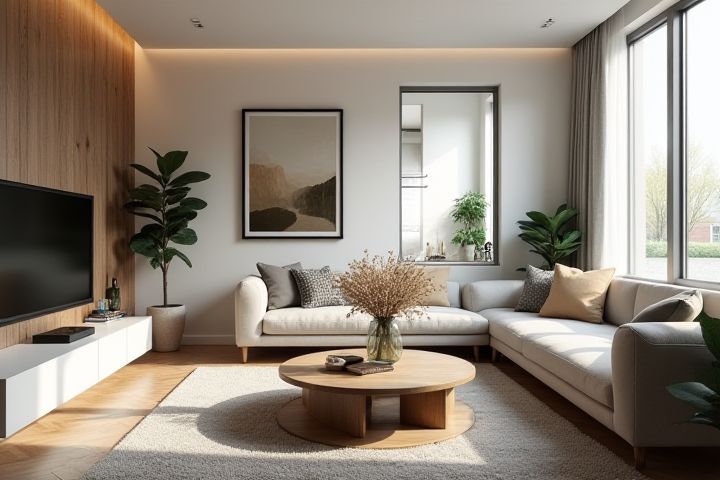
Updating your house for modern living should ideally occur when the space no longer meets your lifestyle needs or when significant maintenance issues arise. Homeowners often consider renovations when experiencing outdated appliances, inefficient heating and cooling systems, or inadequate storage solutions. Investing in smart home technology, such as smart thermostats or security systems, can enhance convenience and energy efficiency. If your interiors feel cramped or uninspired, reconfiguring layouts or refreshing decor can create a more functional and inviting atmosphere. Ultimately, recognizing shifts in your lifestyle--like working from home or growing a family--can guide you in determining the right time for updates.
When To Update A House For Modern Living
Energy efficiency upgrades
Updating your house for modern living, especially through energy efficiency upgrades, is essential for reducing utility bills and enhancing environmental sustainability. You should consider implementing high-efficiency HVAC systems, energy-efficient windows, and advanced insulation materials to improve thermal performance. Solar panels can provide renewable energy, decreasing reliance on fossil fuels while increasing your property's value. Regularly assess your home's energy consumption and stay informed about the latest energy-saving technologies to ensure optimal performance and comfort.
Smart home technology integration
Updating your house for modern living should ideally occur during major renovations or when replacing outdated systems, especially if you aim for smart home technology integration. Implementing devices such as smart thermostats, security cameras, and lighting controls can enhance energy efficiency and security. Consider the structure's compatibility with high-speed internet, as seamless connectivity is essential for smooth operation of smart devices. Incorporate a centralized hub to manage your systems effectively, ensuring a cohesive and user-friendly experience.
Modern kitchen renovations
Modern kitchen renovations typically focus on incorporating open floor plans, maximizing space efficiency, and utilizing energy-efficient appliances. Consider introducing smart technology, such as Wi-Fi-enabled ovens and refrigerators, which can enhance your cooking experience and save energy. The average cost of a kitchen remodel ranges from $12,000 to $35,000, depending on the extent of renovations and materials chosen. As lifestyle trends shift towards sustainable living, integrating eco-friendly materials like bamboo countertops or recycled glass backsplashes can elevate your kitchen's appeal while benefiting the environment.
Updated electrical systems
Updating your house's electrical systems is essential for modern living, particularly if your home was built before the 1990s, as older systems may not meet today's power demands. A standard home now requires a minimum of 200-amp service to support multiple devices and appliances, ensuring safety and efficiency. Upgrading your electrical panel not only accommodates new technology but also enhances security with features like circuit breakers and surge protectors. Consider hiring a licensed electrician to assess and improve your wiring, bringing your home up to code and enhancing its overall value.
Open floor plan designs
Updating your house to embrace modern living often means incorporating open floor plan designs, which encourage seamless flow between spaces. Studies show that homes with open layouts can increase the perceived value by up to 15%, making them more appealing to potential buyers. When remodeling, consider removing non-structural walls to create a fluid environment connecting the kitchen, dining, and living areas. You can enhance this design with features like large windows or sliding glass doors, which can improve natural light and energy efficiency, ultimately transforming your home into a welcoming and functional space.
Bathroom modernizations
Updating your bathroom can significantly enhance both comfort and property value, with a focus on key areas such as fixtures and layout. A modern bathroom typically features energy-efficient appliances, which can reduce water usage by up to 30%, contributing to sustainability and cost savings. You should consider incorporating smart technology, like motion-sensor faucets and programmable thermostats, to improve convenience and efficiency. For an aesthetically pleasing design, choose neutral tones and durable materials that can withstand wear while providing a contemporary look.
Sustainable building materials
Updating your house for modern living should prioritize sustainable building materials to enhance energy efficiency and reduce environmental impact. Consider integrating reclaimed wood, which not only adds aesthetic value but also reduces deforestation. Utilizing recycled steel in construction can provide durability while minimizing raw material consumption, contributing to a lower carbon footprint. Incorporating bamboo, a rapidly renewable resource, can elevate your home's design and improve indoor air quality, making it an environmentally friendly choice.
Fresh interior and exterior painting
Updating your house for modern living can significantly enhance both aesthetics and value. Fresh interior painting can increase your home's resale value by 1-3%, while a new exterior coat can improve curb appeal by 10-20%. Aim to refresh your walls every 5-7 years, using trending colors that resonate with today's designs. Don't overlook the potential of updating your home's exterior hues to create a lasting impression on visitors and future buyers alike.
Improved insulation
Consider updating your house for modern living by enhancing insulation for improved energy efficiency. Upgrading to high-performance insulation can reduce heating and cooling costs by 20% to 30%, making your home more comfortable year-round. Research indicates that homes with superior insulation can achieve energy savings of approximately $200 annually. You might want to focus on areas such as attics, walls, and basements, where upgrading insulation can significantly impact your home's overall performance.
Enhanced outdoor living spaces
Enhancing outdoor living spaces is crucial for transforming your home into a modern sanctuary, especially if you invest in features like a composite deck or a stone patio. A well-designed outdoor area increases property value by as much as 12%, making it a sound investment. Incorporating smart technology, such as lighting and irrigation systems, can elevate your outdoor experience while promoting energy efficiency. By creating zones for relaxation or entertainment, you ensure your outdoor space meets contemporary lifestyle needs and complements indoor living.
